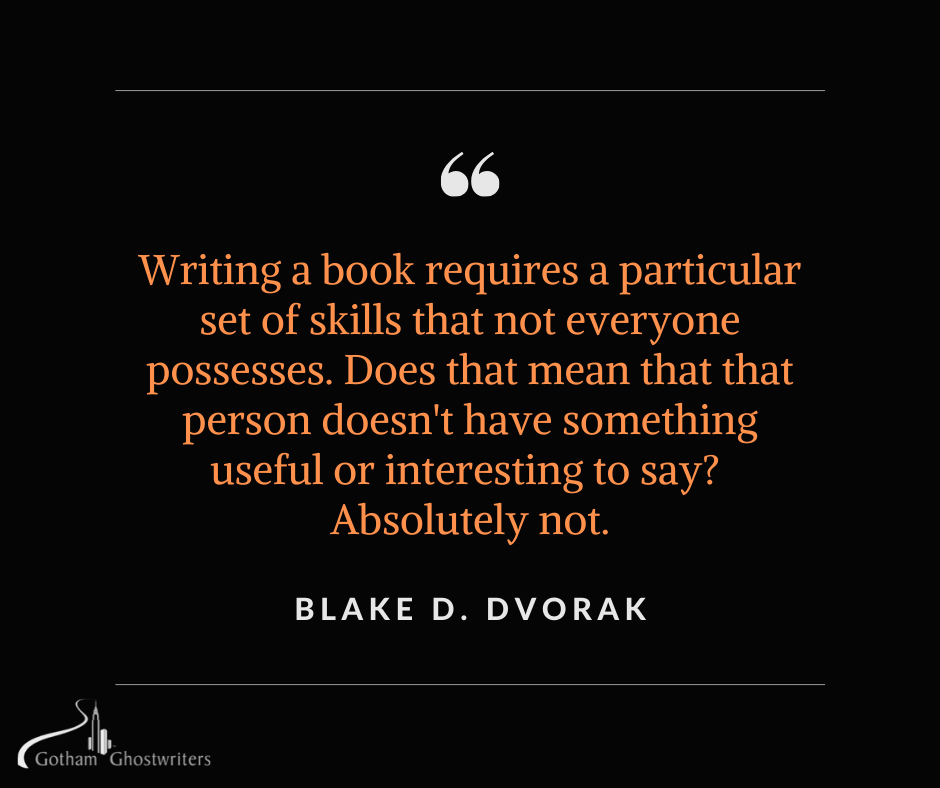The question of authorship and authenticity can be a fraught topic when working with a ghostwriter. We find that the subject comes up often in our world. It’s very common (and generally widely accepted) for businesspeople, activists, public advocates, politicians, actors, influencers, and thought leaders to work with a ghostwriter. After all, a businessperson has expertise in their industry, but may not be skilled at writing, so they leverage the skills of an expert like the ones in our network to more effectively tell their stories.
But in an internet-driven culture that’s heavily focused on personal voice and authenticity, it makes sense that there is a certain level of scrutiny around it. Just this week, our very own CEO Dan Gerstein weighed in on an article about the ethics of ghostwriting penned by Jenny Rough for WORLD magazine. In addition to Dan’s thoughts, it includes discussions of authenticity in authorship from ghostwriters and agents, as well as some interesting insights from actor Gary Sinise about his experience working with ghostwriter Marcus Brotherton.

We raised the question in a conversation with veteran ghostwriter Blake D. Dvorak, who is part of our network and has ghostwritten or collaborated on 10 books, including four New York Times bestsellers. He specializes in projects with a strong biographical element, personal or professional, as well as those that emphasize story. Prior to becoming a freelance writer full-time, Blake was a member of the Washington Times editorial board, an assistant editor at RealClearPolitics.com, and the senior writer for the Pinkston Group, a public relations firm headquartered in the Washington, D.C., area. (Learn more about his projects and writing philosophies at blakedvorak.com.)
When we brought up the topic of the stigma that’s sometimes associated with ghostwriting, Blake shared this wisdom:
I tell my wife all the time that I’m great at parties because people are fascinated by what I do. A lot of people are aware that ghostwriting exists. They’re fascinated by this idea that some people don’t write their own books, or, at least, that they are helped.
The way I define ghostwriting is collaboration. What I tell my clients often is that this book would not exist without you, and it also wouldn’t exist without me. The two forces coming together is what produces a book.
The idea that somebody must suffer in labor and work themselves to the bone to produce a book? Typing away furiously into the long night? It’s a romantic idea of writing—the idea that a book is a very personal endeavor, that it’s something that’s done by yourself, that you put a lot of yourself into.
The reality is that the romantic idea was always just that. Any writer would tell you that the art of writing is as workaday, nine-to-five as any other job. The best writers are those who treat it as any other job, not as some romantic endeavor. And when you see it like that, when you see a book as a product of one’s workday, I think that helps reduce this mysticism that surrounds book writing.

I think technology helped to open it up. The proliferation of titles allowed others to say, Look, I have no time, or, I don’t have the skill set to write a book. And that is OK! Writing a book requires a particular set of skills that not everyone possesses. Does that mean that that person doesn’t have something useful or interesting to say? Absolutely not. Just because a person doesn’t have the time, energy, or skill set to produce a 50, 60, 70,000 word manuscript, doesn’t mean that their ideas shouldn’t be out there.
There’s also the ghostwriting side of it, my side. When I tell people what I do, they’ll ask, what does it feel like having your work out there under somebody else’s name? Doesn’t that aggravate the ghostwriter? And the answer is — at least for me — not at all. I’m not different from anybody else whose work during the day leads to the creation of a product later on. Your name might not be on it, but you know what you did and the fulfillment and satisfaction that you get. You remember when the book was nothing more than an idea. Oftentimes it’s an arduous process to an actual physical copy, and, frankly, a lot of people would abandon it if they were on their own. But when two forces work together to produce it, the writer and the author, that’s how you get the momentum to bring it across, to finish it so that you can hold that book in your hand.
The best projects that I have worked on, the author — the person whose name is going to be on the book — is heavily involved every step of the way. That involvement varies depending on the client, but they are an active participant, so that by the time the book is on a shelf or on a website ready to be sold, they can confidently claim that, Yes, this is mine. It doesn’t necessarily matter that I had somebody help me with the creation of it. These are my ideas. This is my life. This is my story, which is now out there. And it otherwise would not have been out there, had I not had a collaborator help me work through it.
Do you have a book idea? Pitch it to us below, and we’ll match you with a writer like Blake who can help you bring your vision to life.
